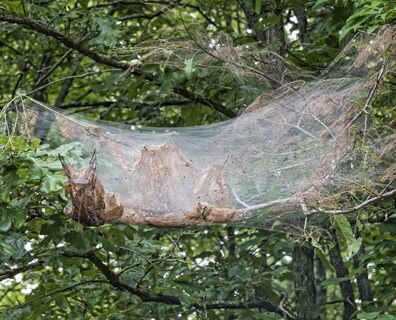 A tree can be a majestic sight, it can inspire us. Words like imposing, magnificent and marvelous usually come to mind.
A tree can be a majestic sight, it can inspire us. Words like imposing, magnificent and marvelous usually come to mind.
Sometimes, though, massive spider webs embedded in the trees toss these words out and get replaced by something like eerie and terrifying.
Now, you might be asking to yourself: just what kind of spiders builds webs in trees. Interestingly enough, is not spiders at all. But rather; another type of tree pest, called fall webworms. But, what are they? Why do they build webs? Learn this and how to get rid of those pesky nests on your tree.
Why my trees, what is it about them?
Now you know that it is not actual spiders, but fall webworms, known as aesthetic pests.
These so-call worms are caterpillars that feed on trees and, while doing so, weave a thick web. They feed on over 100 different types of trees but fruity ones are their favorites.
How long will they stick around?
Fall webworms earn their name for a reason. Their webs are commonly spotted around the fall season.
However they are present year-round, laying eggs in winter that will hatch in spring. Then summer time means lunch as they feed off your tree leaves; starting the webbing process come fall.
So, how much of a big deal are they? Are my trees doomed?
Not at all; like we mentioned before, fall webworms are an aesthetic pest. While the latter word sounds pessimistic. They are not poisonous and won’t damage aged trees.
However, it can be a different story for very young trees. Fall webworms feed on leaves and excessive feeding can cause total leaf loss before trees complete their development. You need to be on the lookout and protect your younger trees, so they may thrive.
Ok, so how do I get rid of these “spider webs”?
A good stroke with a broom or similar object is always a great start, use it to remove webs from branches and make your trees look great again.
Keep in mind that the winter season means fall webworms are holed up in their cocoons rather than their webs. If you’re not throughout enough, they will return when summer arrives.
A more permanent solution is to cut off branches that are webbed. Or spray the leaves, not the webs themselves, with insecticide.
